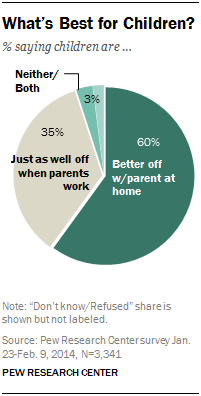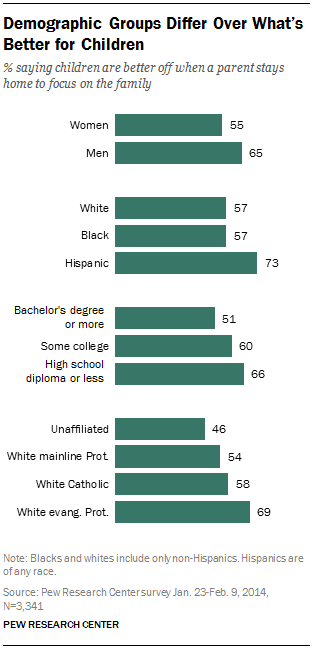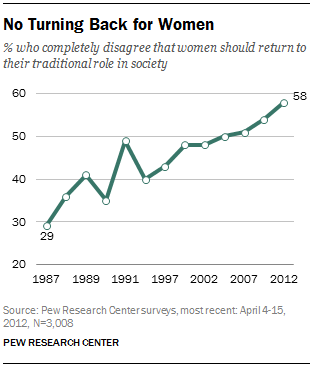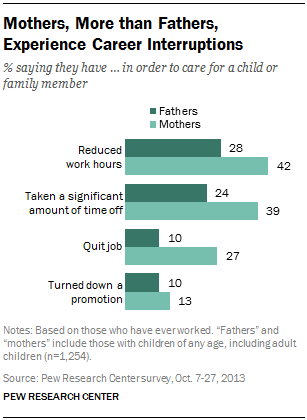 Despite the fact that most mothers in the U.S. work at least part time, many Americans continue to believe that having a mother who stays at home is beneficial for a young child, though as is often the case with public opinion variations in question wording elicit slightly different responses. A recent Pew Research survey focusing on “parents,” rather than just on mothers, asked Americans which statement came closer to their view: First, children are better off when a parent stays home to focus on the family; or second, children are just as well off when their parents work outside the home. Fully six-in-ten adults chose the first statement and only about one-third (35%) chose the second statement.18
Despite the fact that most mothers in the U.S. work at least part time, many Americans continue to believe that having a mother who stays at home is beneficial for a young child, though as is often the case with public opinion variations in question wording elicit slightly different responses. A recent Pew Research survey focusing on “parents,” rather than just on mothers, asked Americans which statement came closer to their view: First, children are better off when a parent stays home to focus on the family; or second, children are just as well off when their parents work outside the home. Fully six-in-ten adults chose the first statement and only about one-third (35%) chose the second statement.18
Men (65%) are somewhat more likely than women to say children are better off when a parent stays home. But even among women, 55% say having a parent at home is better for a child. Four-in-ten women say children are just as well off when their parents work outside the home.
 Sharper differences of opinion on this question emerge across ethnic, socioeconomic and religious lines. Hispanics are considerably more likely than whites or blacks to say children are better off with a parent at home—73% of Hispanics say this, compared with 57% of both whites and blacks. These attitudes may be linked to behaviors as Hispanic mothers are among the most likely to be stay-at-home mothers.
Sharper differences of opinion on this question emerge across ethnic, socioeconomic and religious lines. Hispanics are considerably more likely than whites or blacks to say children are better off with a parent at home—73% of Hispanics say this, compared with 57% of both whites and blacks. These attitudes may be linked to behaviors as Hispanic mothers are among the most likely to be stay-at-home mothers.
Views also differ significantly by educational attainment, with support for working parents rising as educational levels rise, though in no group does a majority say children are just as well off when their parents work. Among college graduates, 51% say children are better off with a parent at home to focus on the family, while 43% say children are just as well off when a parent works. And college-educated women are one of the few groups in which a plurality (50%) say children are just as well off with working parents. By contrast, among adults with a high school diploma or less education, fully 66% say children are better off with a parent at home and only 30% say children do just as well with working parents. Adults with some college education, but not a bachelor’s degree, fall in the middle–60% say having a parent at home is preferable, and 35% say it doesn’t matter either way.
Religious affiliation is also strongly correlated with views on this issue. Among white evangelical Protestants, 69% say it’s better for children if a parent is at home to focus on the family, and 26% say children are just as well off when their parents work outside the home. White mainline Protestants and white Catholics are more evenly split on this question, although each group leans toward saying that it is better for children to have a parent at home. Adults who are not affiliated with any religion are among the least likely to say children are better off with a parent at home (46%). About half (50%) say children are just as well off when their parents work outside the home.
Among parents with children younger than 18, mothers (56%) are less likely than fathers (69%) to say it is better for children to have a parent at home. Women’s views on this issue are fairly consistent, regardless of whether or not they have children. But among men, there’s a wide gap between fathers and non-fathers. While about seven-in-ten fathers say children are better off when a parent stays home to focus on the family, only 58% of men who are not fathers agree.19
Previous polling has shown that the public clearly differentiates between mothers and fathers when considering what is best for children. In a 2013 Pew Research survey, respondents were asked whether children are better off if their mother is home and doesn’t hold a job, or if they are just as well off if their mother works. Some 51% of respondents said that children are better off if their mother is at home, while 34% said they are just as well off with a working mother. And, in a separate question, they were asked about fathers and their children. Only 8% of all adults said that children are better off if their father is home and doesn’t hold a job, while 76% said children are just as well off if their father works.
That same 2013 survey found that while the public recognizes the clear economic benefits of having more mothers in the workplace, many voice concerns about the toll this is having on children. Roughly two-thirds of adults (67%) say the increasing number of women working for pay outside the home has made it easier for families to earn enough to live comfortably. But at the same time, 74% say this trend has made it harder for parents to raise children.
Asked what the ideal situation is for young children, the share of Americans who say having a mother who does not work outside the home is ideal has declined since a 2009 Pew Research Center survey, when 43% said so, to 2012, when 33% did. A plurality (42%) in 2012 said having a mother who works part time is ideal for young children, while 16% said a full-time working mother is ideal. When the question was asked from the mother’s point of view—which situation is ideal for women with young children—the results were similar: 33% in 2012 said not working at all was ideal, compared with 39% who said so in 2009.
 Opinions about what is best for children have changed considerably over time. In 1985 when the General Social Survey asked about the impact that a working mother might have on a young child, some 55% of adults agreed that “a pre-school child is likely to suffer if his or her mother works.” By 2012, only 35% of adults agreed with that statement.
Opinions about what is best for children have changed considerably over time. In 1985 when the General Social Survey asked about the impact that a working mother might have on a young child, some 55% of adults agreed that “a pre-school child is likely to suffer if his or her mother works.” By 2012, only 35% of adults agreed with that statement.
Similarly, views about what is best for women also have evolved. In spite of the public’s ambivalence about the role of mothers and the merits of staying at home versus working, very few adults believe that society should turn back the clock. Pew Research has been tracking views on this issue for 25 years. In 2012, only 18% of adults agreed that women should return to their traditional role in society. This is down from 30% who endorsed this idea in 1987. Over the same period, the share of adults who completely disagree that women should return to their traditional roles has risen from 29% to 58%.
In a Pew Research Center survey in 2012, a plurality of working and stay-at-home mothers said that the ideal situation for them is to work part time. Only 36% of stay-at-home mothers said that not working at all is ideal for them. The share of stay-at-home mothers who said that not working at all is their ideal situation has fallen since 2007, when 48% said so.
 Despite the additional time they spend on child care, mothers who do not work outside the home give themselves slightly lower ratings than working mothers for the job they are doing as parents. In a 2012 survey, 66% of stay-at-home mothers rated themselves as “excellent” or “very good” parents, compared with 78% of working mothers.
Despite the additional time they spend on child care, mothers who do not work outside the home give themselves slightly lower ratings than working mothers for the job they are doing as parents. In a 2012 survey, 66% of stay-at-home mothers rated themselves as “excellent” or “very good” parents, compared with 78% of working mothers.
There is also a middle ground for parents between working and staying at home, and some adults move in and out of these categories over the course of their careers.
A recent Pew Research survey found that women are much more likely than men to report having had a significant career interruption related to family caregiving. Among adults who have ever worked, fully 42% of mothers say they have reduced their work hours in order to care for a child or other family member. This compares with 28% of fathers. And roughly the same share of mothers (39%) say they have taken a significant amount of time off from work in order to care for a family member (compared with 24% of fathers). About one-quarter of mothers (27%) with some work experience say at some point in their working life they quit their job in order to care for a child or other family member.


 Fact Tank 7 Key Findings About Stay-at-Home Moms
Fact Tank 7 Key Findings About Stay-at-Home Moms